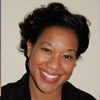Blind Spots
Seeing the dents, dings, and beauty
by Ayana Teter
So it has recently come to my attention that perhaps I’m not the best driver, or parker, to be more precise. I realized this as I was examining my bumper after an altercation with a taller-than-average concrete parking barrier. You see, I was on a pastoral mission and needed to fit my minivan into a narrow parking space, so I permitted my tire to every-so-gently kiss the curb, but in the process I became stuck.
Nevertheless, this has happened to me before so I knew precisely how to free myself from the situation. I would give it another gentle kiss, this time until my van dropped into place neatly between the yellow lines. Later, as I surveyed the outcome of this encounter, I noticed the fresh scrapes that happen when rough concrete meets a factory paint job!
But what happened next was quite uncharacteristic of my relationship with my automobile. I paused and stood next to the van to let my eyes linger over the car. Then I touched each and every scrape, dent and ding. And, as I slowed down long enough to truly see, a new narrative emerged. I remembered all of the places that I had been in which I added a new ding to my car, some through no fault of my own, but many others through my own carelessness. And as I looked at my car through the vantage point of my bumper, I realized that even after twenty years on the road I still had much to learn. I still had to refine some basic driving skills. I had had a blind spot as to how my driving was affecting my car, but now I could see clearly!
We all have blind spots, those areas where we cannot see how our practices and values and attitudes impact our lives and the lives of others we are in community with. But if we seek to live more faithfully into what Christian community is meant to be, then it is helpful to make a habit of humbly asking ourselves what we are missing and what it is that we can not see.
As the associate minister for the south branch of Pittsburgh Presbytery, one of the greatest joys that I have is the privilege of getting to see congregations with fresh eyes from the vantage point of an outsider. I enter new churches every week. Some are in times of transition, others in conflict, and others just simply celebrating the familiar rhythms of weekly worship and I have the privilege of seeing each unique collection of God¹s people with fresh eyes from a vantage point that their habitual day to day life often keeps them from observing.
Sometimes I look and I want to yell out, “You are beautiful!” Which is so different from how they see themselves. For, mired in the day-to-day rhythms of dealing with shrinking budgets and less-full pews, these churches can adopt a narrative of decline and diminishment. They become near-blind to the fact that they are following Jesus into new lands as they share the message that the Kingdom of God has come near. And, that is beautiful.
But, there are other times when I have seen a “friendly congregation”only reach out to befriend those who look and speak like them. They had developed a blind spot which blocked out God¹s call at Pentecost to invite and befriend all people regardless of tribe, race, or tongue. But, most of the time I get to see that, despite all the changes of culture and context, we still (and always will) worship the God who has blessed us in Christ with every spiritual blessing in the heavenly places, and who chose us in Christ before the foundation of the world to be holy and blameless before him in love and destined us for adoptions as his children through Jesus Christ, according to the good pleasure of his will! And, when you pause long enough to linger over that, something interesting happens – the blind spots are lifted from our eyes so that we can see things as they truly are. May we never become blind to that!
Reverend Ayana Teter is Associate Minister for Outreach for Pittsburgh Presbytery, and serves as contact for the South branch churches. She has also served as a co-pastor and head-of-staff of a racially, theologically, and culturally diverse congregation in the urban Midwest. She is one of the leaders of the Unglued Church Project.